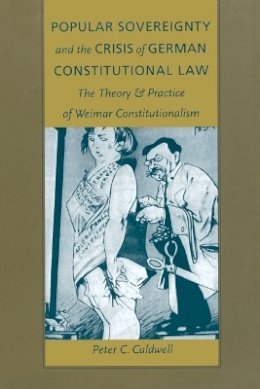
Stock image for illustration purposes only - book cover, edition or condition may vary.
Popular Sovereignty and the Crisis of German Constitutional Law: The Theory and Practice of Weimar Constitutionalism
Peter C. Caldwell
€ 45.72
FREE Delivery in Ireland
Description for Popular Sovereignty and the Crisis of German Constitutional Law: The Theory and Practice of Weimar Constitutionalism
Paperback.
Popular Sovereignty and the Crisis of German Constitutional Law is a historical analysis of competing doctrines of constitutional law during the Weimar Republic. It chronicles the creation of a new constitutional jurisprudence both adequate to the needs of a modern welfare state and based on the principle of popular sovereignty. Peter C. Caldwell explores the legal nature of democracy as debated by Weimar’s political theorists and constitutional lawyers. Laying the groundwork for questions about constitutional law in today’s Federal Republic, this book draws clear and insightful distinctions between strands of positivist and anti-positivist legal thought, and examines their implications for legal and political theory.
Caldwell makes accessible the rich literature in German constitutional thought of the Weimar period, most of which has been unavailable in English until now. On the liberal left, Hugo Preuss and Hans Kelsen defended a concept of democracy that made the constitution sovereign and, in a way, created the "Volk" through constitutional procedure. On the right, Carl Schmitt argued for a substantial notion of the "Volk" that could overrule constitutional procedure in a state of emergency. Rudolf Smend and Heinrich Triepel located in the constitution a set of inviolable values of the political community, while Hermann Heller saw in it a guarantee of substantial social equality. Drawing on the work of these major players from the 1920s, Caldwell reveals the various facets of the impassioned constitutional struggles that permeated German legal and political culture during the Weimar Republic.
Caldwell makes accessible the rich literature in German constitutional thought of the Weimar period, most of which has been unavailable in English until now. On the liberal left, Hugo Preuss and Hans Kelsen defended a concept of democracy that made the constitution sovereign and, in a way, created the "Volk" through constitutional procedure. On the right, Carl Schmitt argued for a substantial notion of the "Volk" that could overrule constitutional procedure in a state of emergency. Rudolf Smend and Heinrich Triepel located in the constitution a set of inviolable values of the political community, while Hermann Heller saw in it a guarantee of substantial social equality. Drawing on the work of these major players from the 1920s, Caldwell reveals the various facets of the impassioned constitutional struggles that permeated German legal and political culture during the Weimar Republic.
Product Details
Format
Paperback
Publication date
1997
Publisher
Duke University Press United States
Number of pages
320
Condition
New
Number of Pages
320
Place of Publication
North Carolina, United States
ISBN
9780822319887
SKU
V9780822319887
Shipping Time
Usually ships in 7 to 11 working days
Ref
99-50
About Peter C. Caldwell
Peter C. Caldwell is Associate Professor of History and German Studies at Rice University.
Reviews for Popular Sovereignty and the Crisis of German Constitutional Law: The Theory and Practice of Weimar Constitutionalism
“A searching examination and critical analysis of the debates in Germany over the meaning and interpretation of the constitution during the Weimar years. No other book in English, so far as I know, treats Weimar constitutionalism with the depth and analytical power of this study. What an admirable study of intellectual history this book is!”—Donald P. Kommers, University of Notre Dame “An outstanding contribution to the literature on 20th-century Germany and its political/legal theory.”—Ellen Kennedy, University of Pennsylvania
